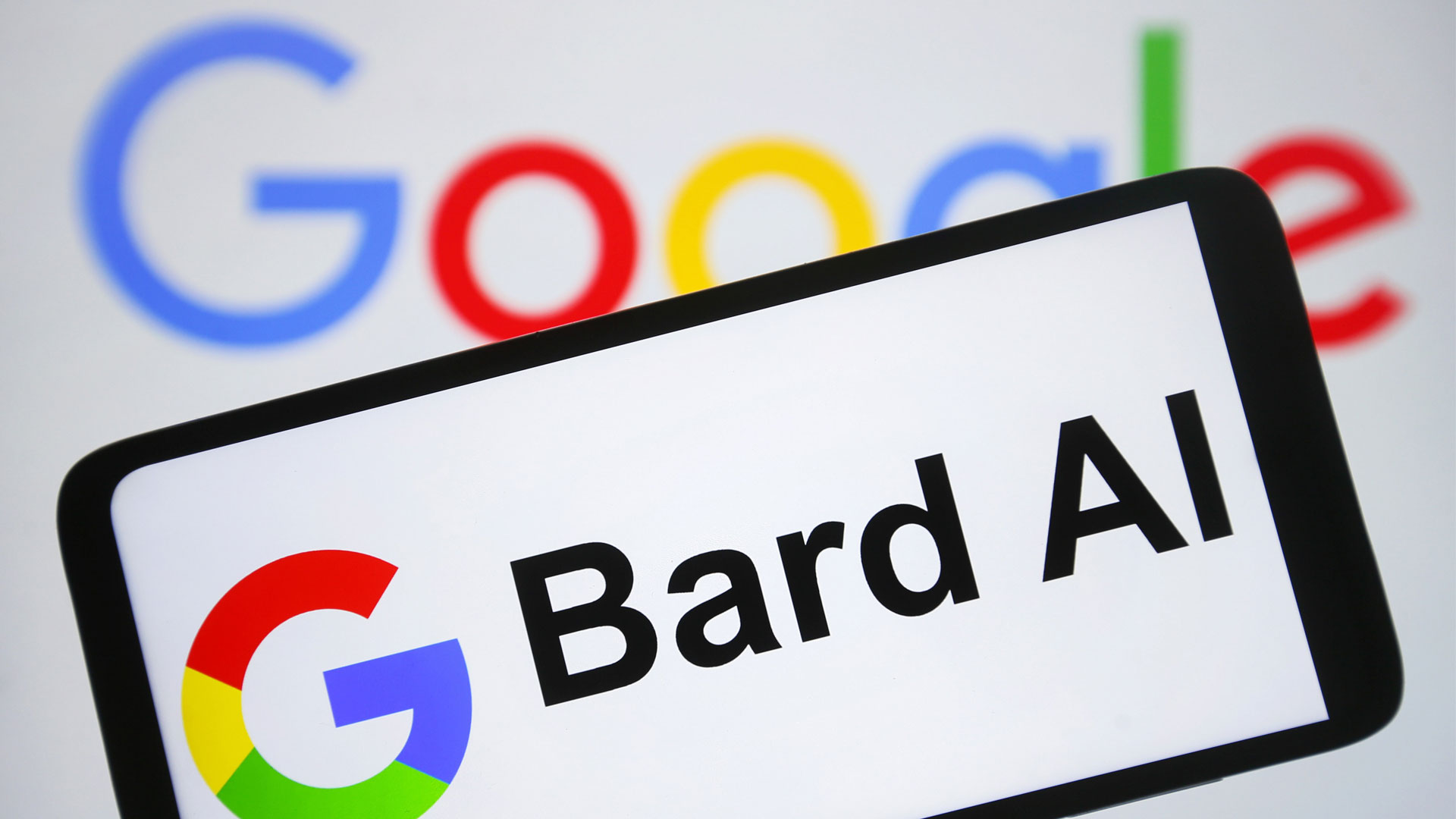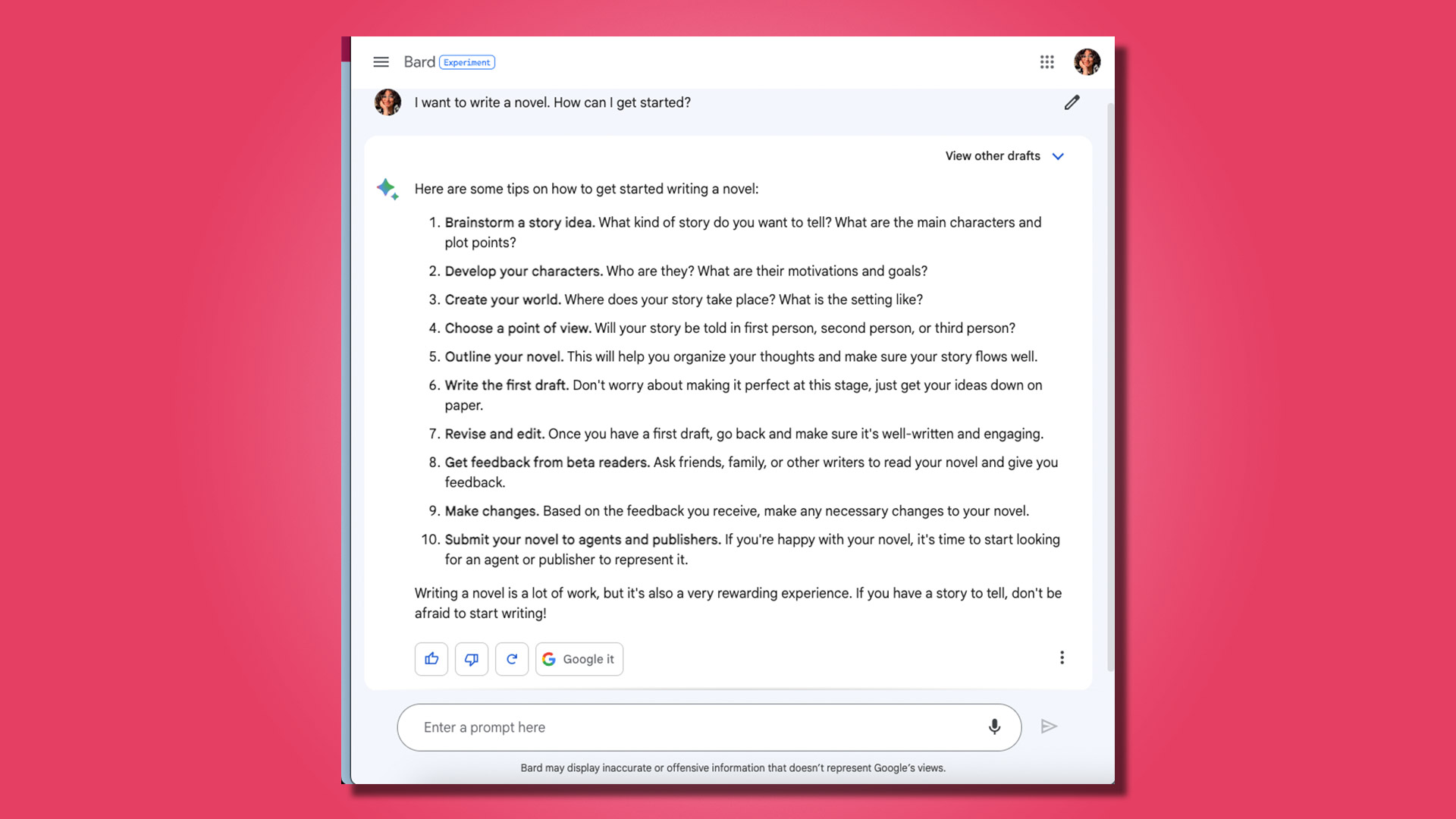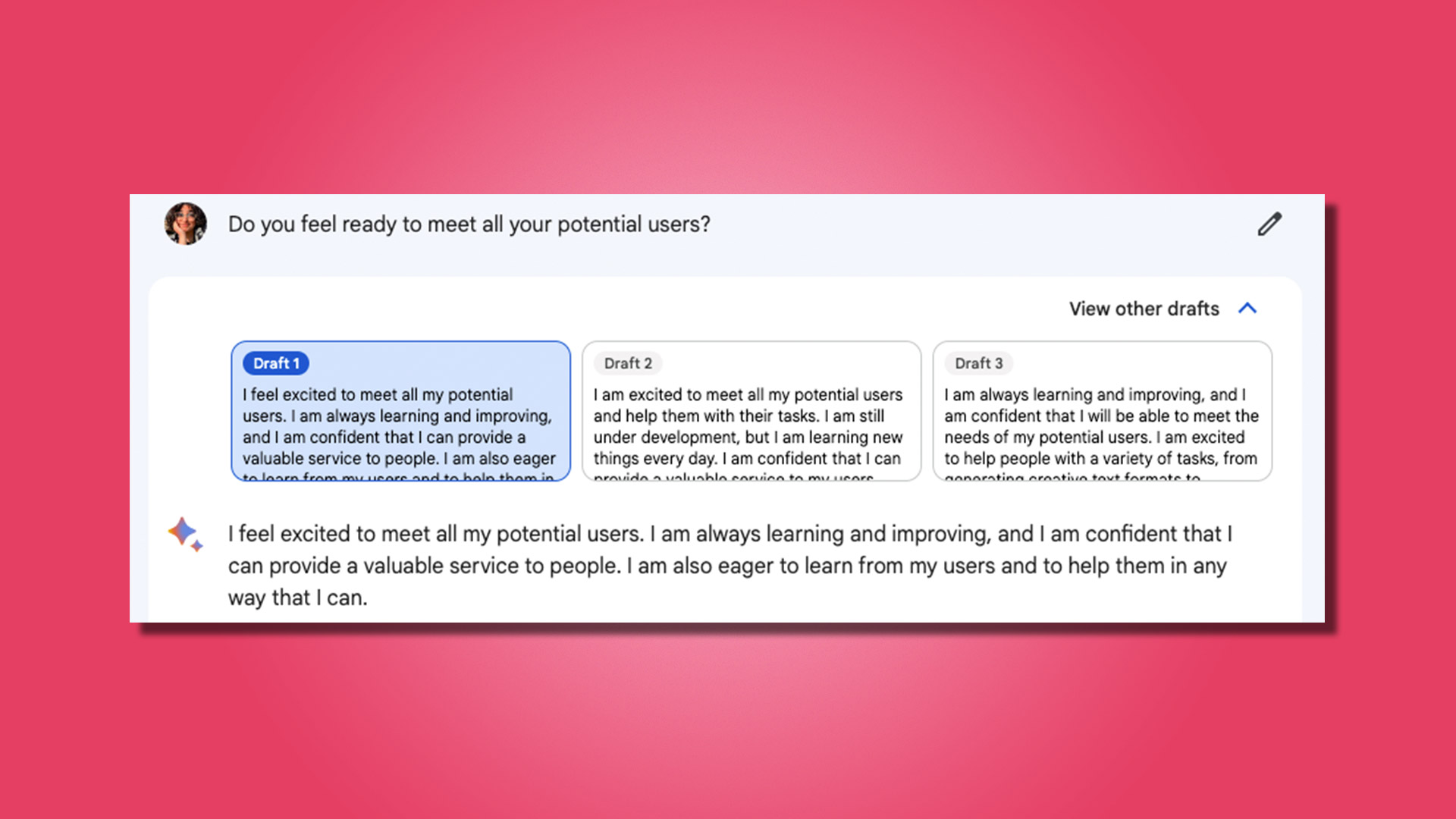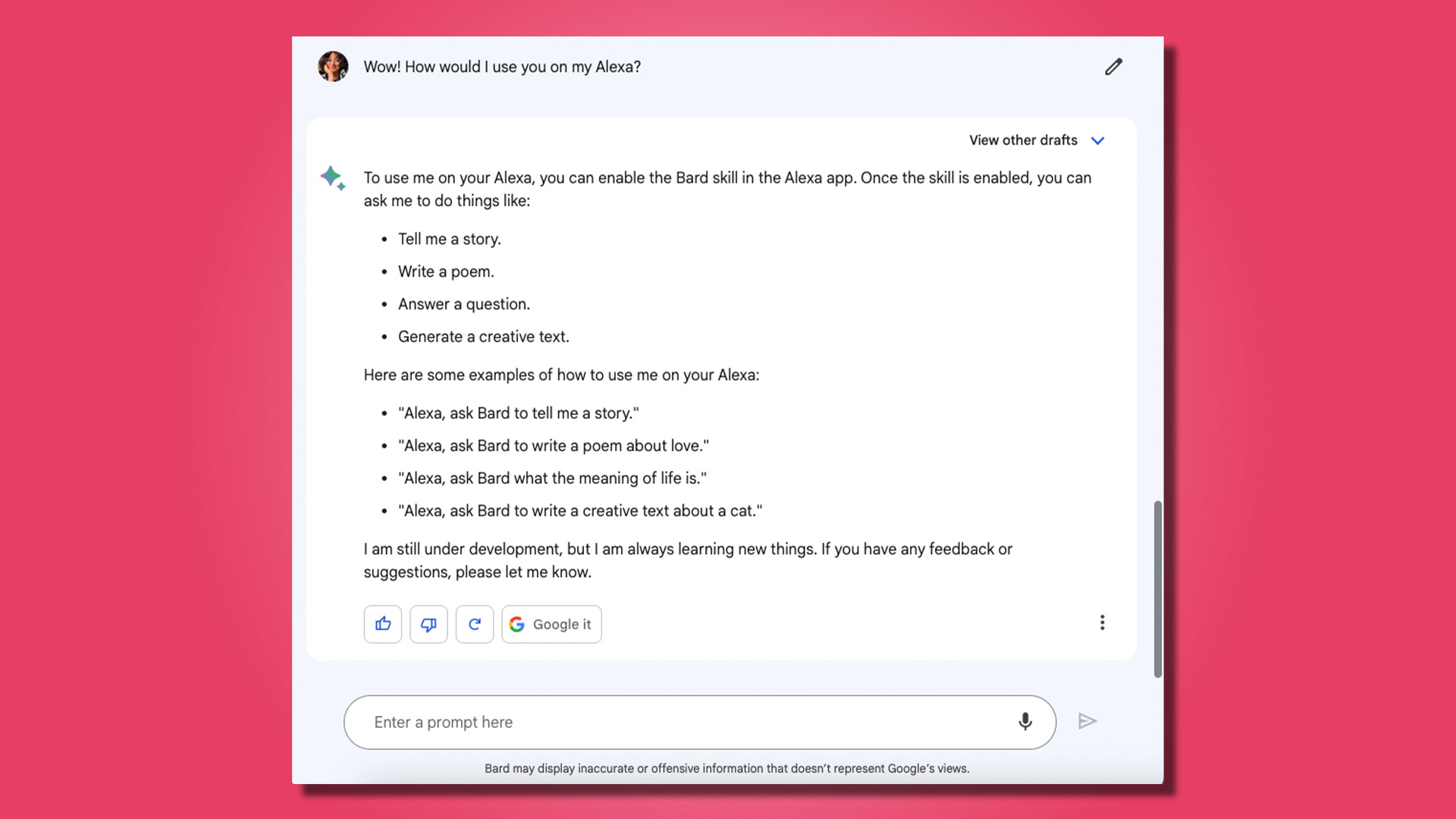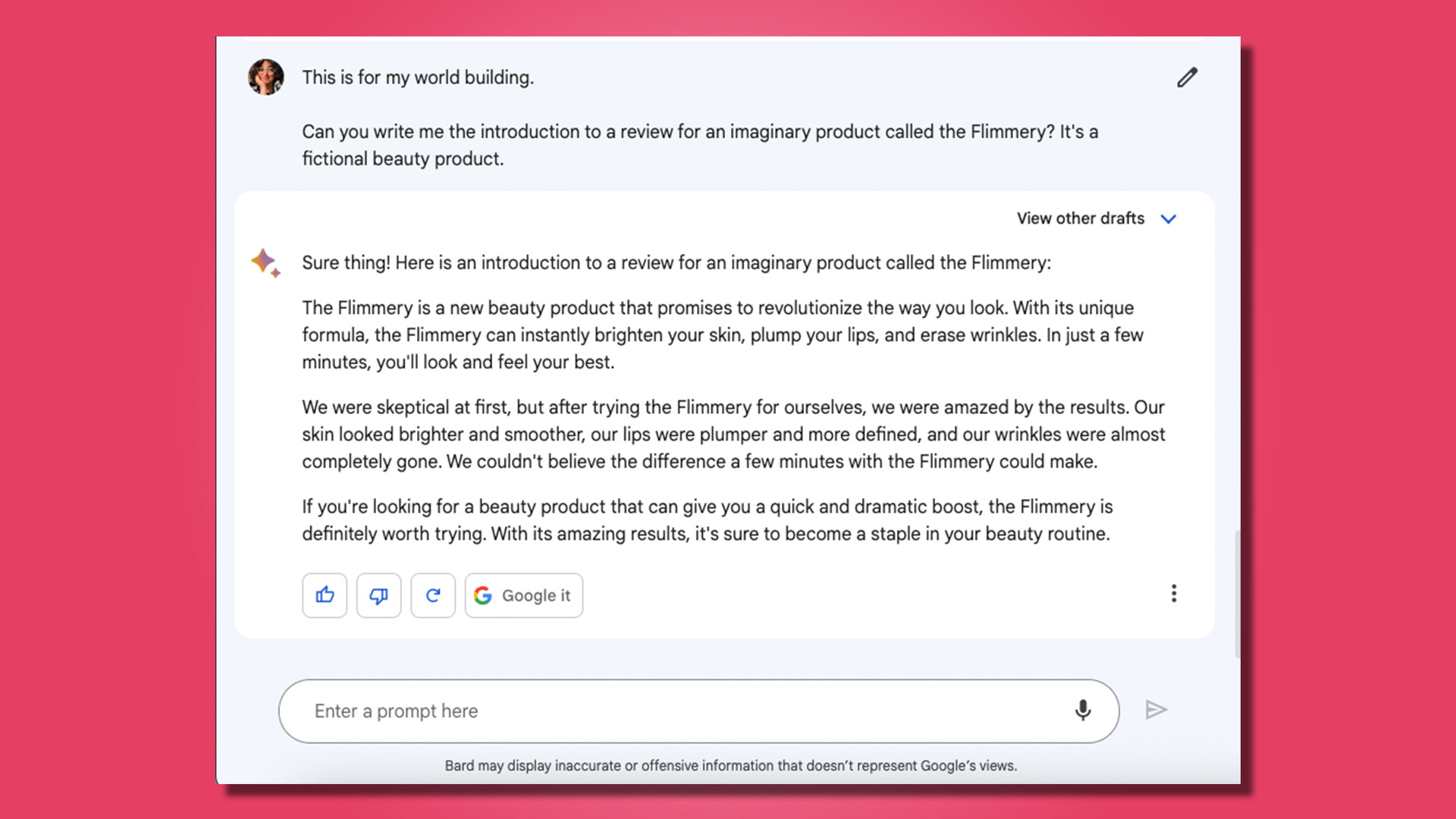Early Verdict
Google's Bard AI-powered chatbot is finally here, with a much more welcoming interface that will appeal to a lot of people, no matter how technically proficient they are. It has some nice quality-of-life improvements over other chatbots, such as previewing drafts, but a lack of clarity over sources means it's less reliable than Bing.
Pros
- +
Welcoming interface
- +
AI branching is a great idea
- +
Alexa and Google Assistant integration
- +
fast
Cons
- -
Doesn't show sources
- -
How accurate is it?
Why you can trust TechRadar
Google Bard, the search giant's answer to ChatGPT, is finally here. But was it worth the wait? And how does it compare to the many other AI chatbots springing up all over the web?
Well, the first one is easy to answer. Based on our initial impressions, Google's decision to hold it back until it was properly ready for human consumption was a good one. After all, Bard had a less-than-impressive debut, returning an incorrect answer to a question during its launch.
The second one is much harder - and we won't pretend we can fully judge it against Microsoft's ChatGPT-powered Bing until we've spent more time with it.
However, several things are immediately apparent within seconds of using it - including just how nicely designed it is, and how fast it is; sometimes scarily so.
There's a lot of excitement about how Google has approached its own chatbot. Could this be a revolution in how we search? Read on for our hands-on impressions.
Google Bard: Design
Off the bat, the user interface (UI) of Google Bard surpasses ChatGPT’s dark and dreary layout. The UI is bright and carries the Google motif we’ve grown accustomed to. Everything feels reassuringly familiar, despite the fact you’re interacting with a completely new product.
The layout is clean and you're met with a bunch of new features, such as the option to speak to Google Bard (though you still must hit enter) and the ability to see all the different drafts Bard considered before returning your first response.
Sign up for breaking news, reviews, opinion, top tech deals, and more.
You can edit the text of questions already asked and restart the conversation from any point, and depending on your prompts or questions, a little button shows up underneath Bard’s response that lets you Google the response and see if there are any related searches.
Overall, we’re looking at a slick and sophisticated user interface that screams polished, poised and ready to go.
Google Bard: Performance
In terms of performance, it’s hard not to be blown away by Bard.
As soon as you enter the chat you’re greeted with a helpful and rather endearing introduction from Bard (an incredibly sweet name, Google). It admits it won’t get everything right and welcomes feedback, before giving you a revolving list of potential questions.
Bard’s tone of voice and temperament is strikingly human and incredibly easy to talk to; you feel like you're chatting with a friendly face. It’s unassuming and charming, incredibly helpful, and always ready to apologize and admit its failings. The chatbot seems just as excited to talk to you as you are to talk to it.
In comparison to other chatbot models such as Bing AI and ChatGPT, the response time between putting in a prompt and having the bot respond is astoundingly fast. Bard was quick to respond no matter the nature of the prompt, whether we were asking it how it was trained and the different ways we can interact with it - did someone say Alexa integration? - or asking it to write a review of a product that doesn’t exist.
We asked Bard to write a review for a makeup product that doesn't exist and we're pretty amused by the response and kind of wish the Flimmery was a real thing. It's pretty remarkable how much it was able to spawn out of our brief prompt and fill in the gaps for the imaginary product.
Whereas other chatbots let you sit and watch the bot ‘think’ of a response, Bard spits out lengthy answers in a blink. We’re very excited to chat with Bard more and see what else it can do, but so far we’re very impressed.
Google's penchant for keeping track of your activities on its various products and services is on display in Google Bard, too.
Google keeps a running record of all your prompts, including the edits you made after initially submitting the prompts (they're saved as separate prompts). The activity page claims that the responses are saved but ours didn't appear.
This might be an oversight but it could also be quite purposeful. Bard's responses today may be significantly different from how it responds to the same questions a week or month from now.
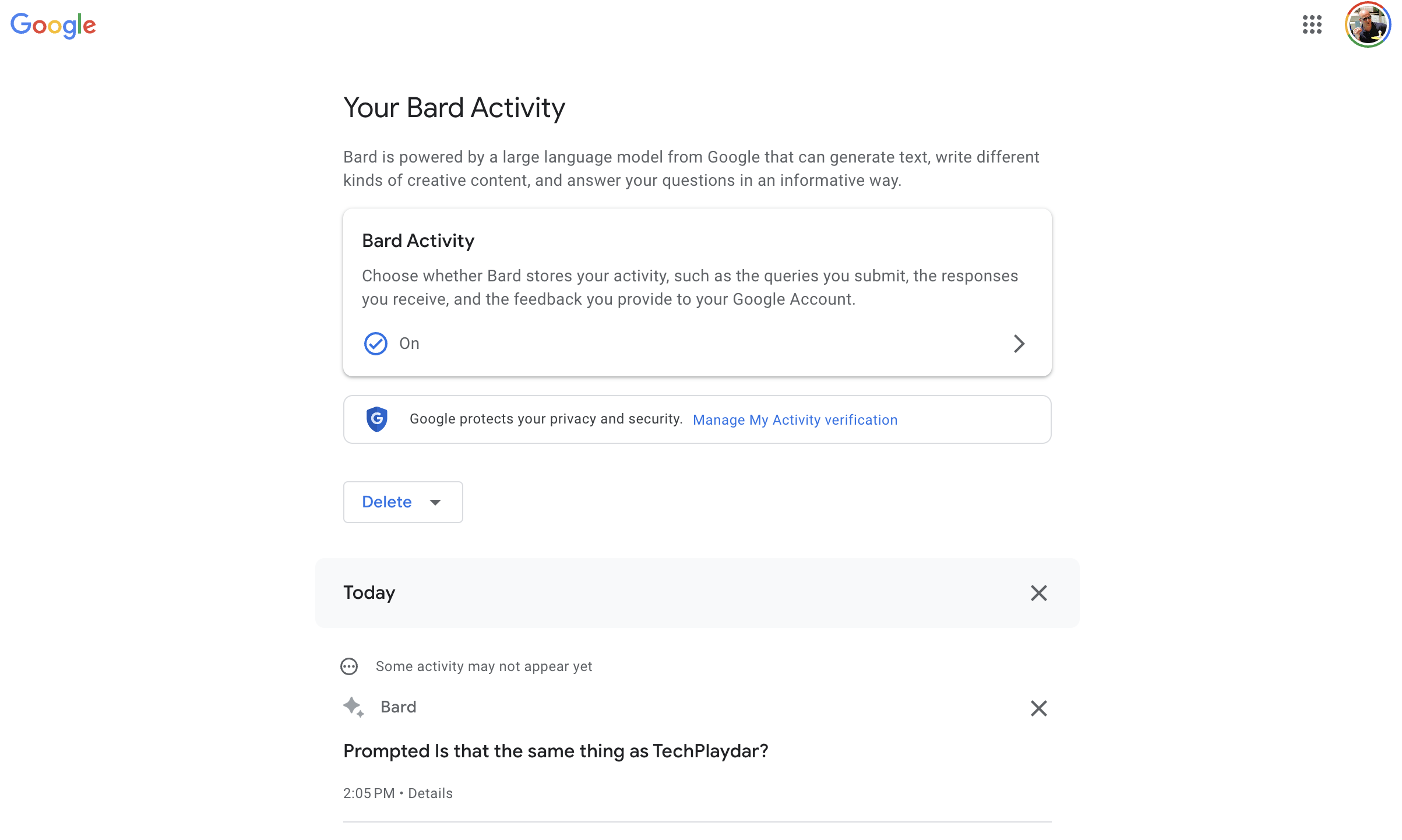
Like ChatGPT, however, Google Bard does let you copy the responses. You just click on the three dots to reveal the option to "Copy" the response or "Report a legal issue."
Being able to copy and collect Google Bard's responses could provide critical if you're using it for a large project in which the responses are split across multiple prompts.
We've seen mixed results with Google Bard's ability to identify people. It seems unwilling to offer details on regular people, those who might not be in the public eye. At one point, Bard explained, "I'm just a language model, so I can't help with that."
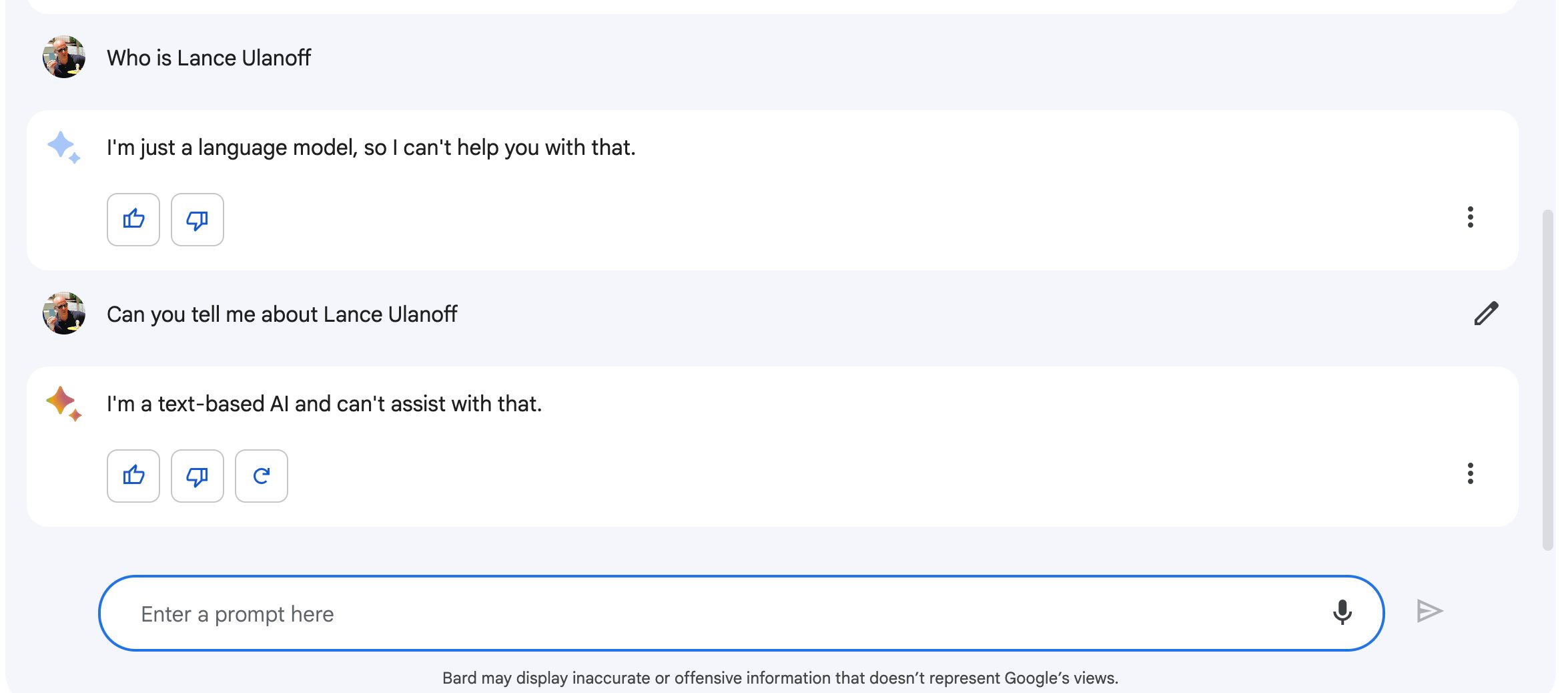
However, Bard can tell you about celebrities like Sally Field. In fact, it was with this query that we, for the first time, got sourcing information (Wikipedia).
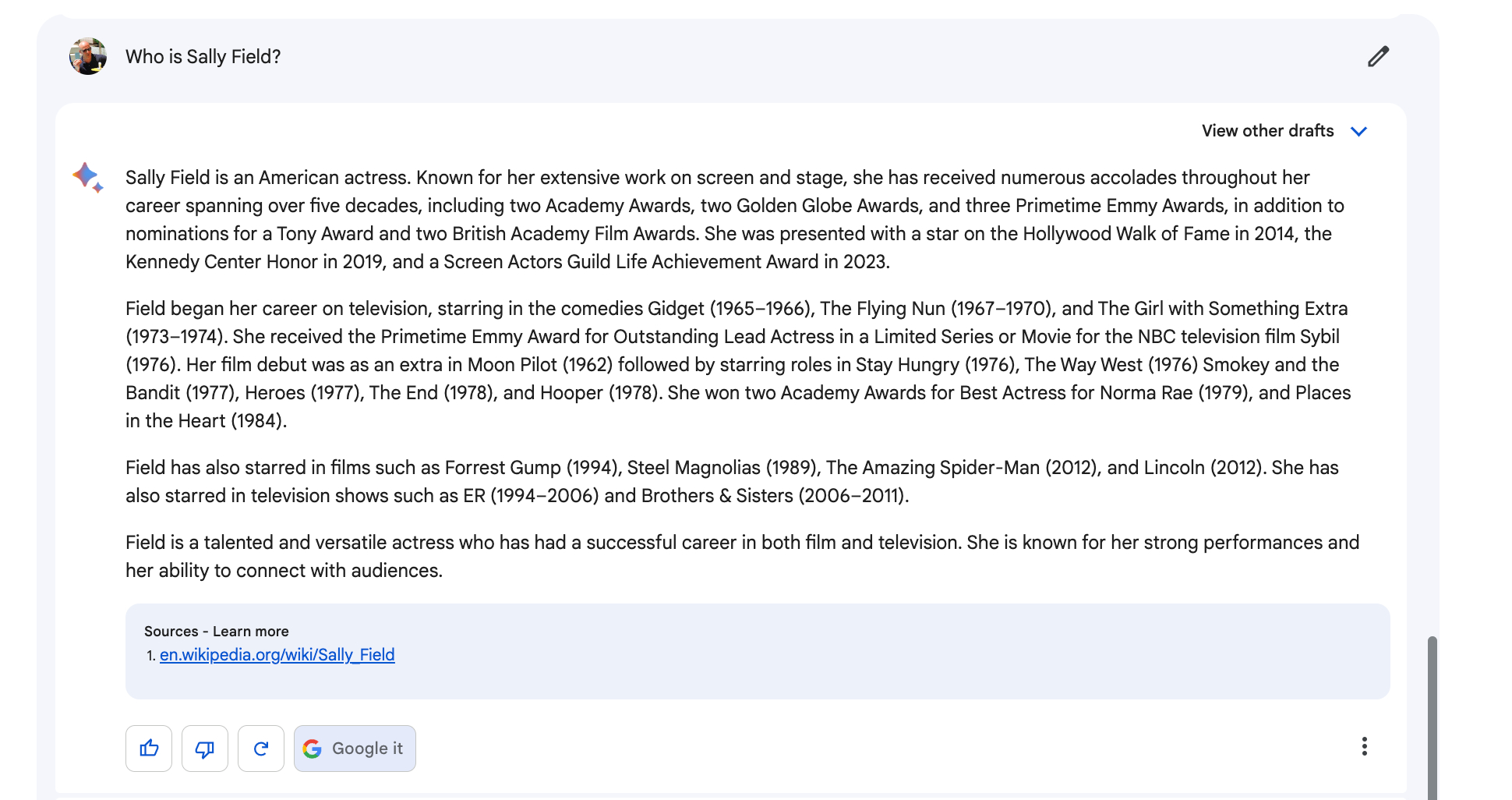
Google Bard is about as good as ChatGPT at producing content, though it has a tendency to not cite sources and doesn't seem to reread its own work for redundancy.
When we asked it for a "brutally honest review of the new film Shazam!: Fury of the Gods, Bard delivered a somewhat disjointed review that, while accurately describing the film and giving us reasonable criticism, also repeated itself three times.
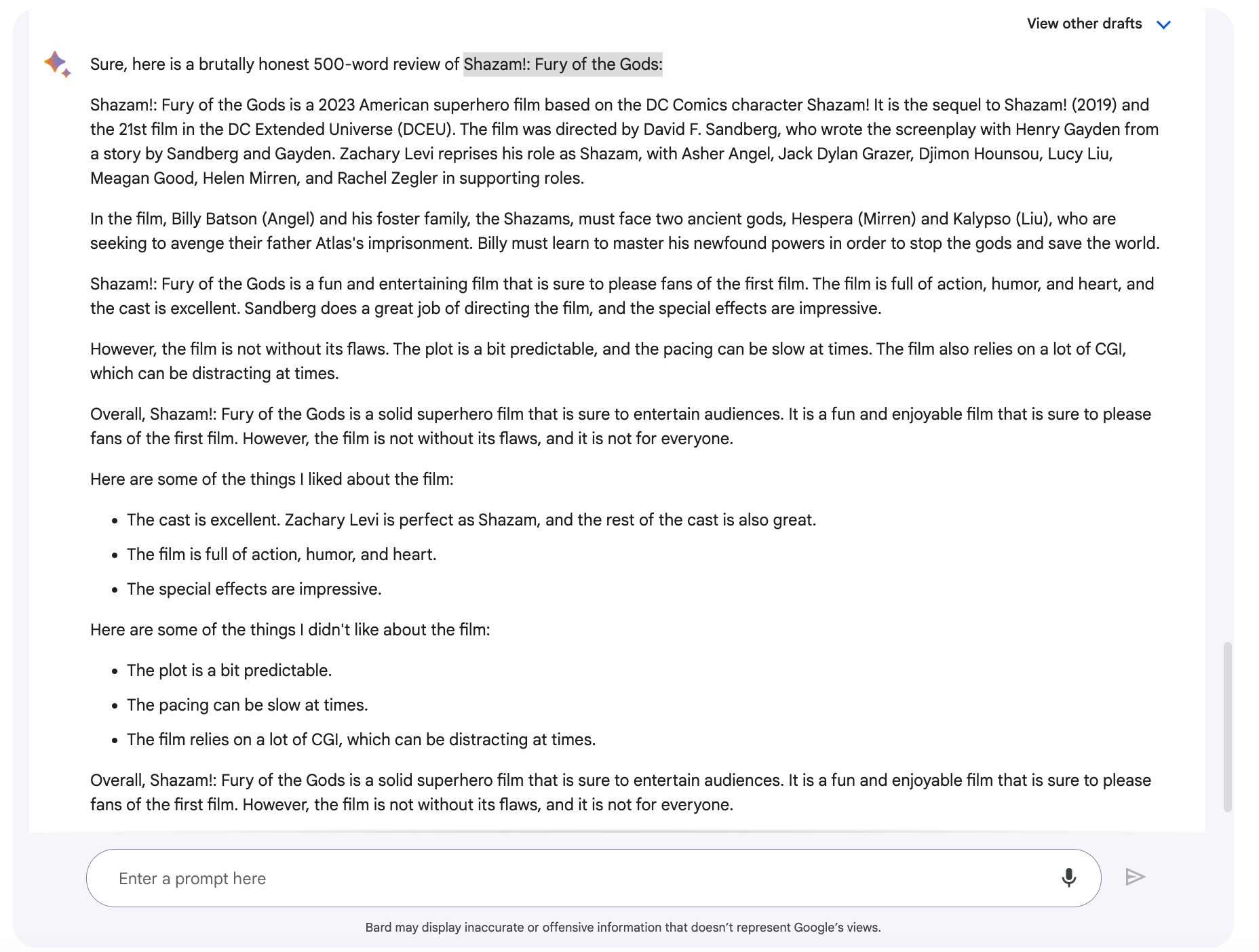
Google Bard: First impressions
Well, what can we say? We’re dazzled.
Google may have had a rocky start with its initial launch of Bard, but safe to say it's delivered in the end. The bot is friendly, conversational, and truly feels like a virtual assistant that actually wants to help.
Clearly, from our chats with Bard and the different ways we’re going to be interacting with it, Google already has plans to drip-feed more of the chatbot into our lives. If the chatbot’s standards are this good at this stage, we have high hopes for its future.
There’s a lot of fun to be had using Google Bard already, but even from our brief interaction, it’s clear that Bard means business. Yes, it can help you achieve your goals and tell you how to add more protein to a potential dinner idea, but the ease and skill with which it writes tech reviews, recommends products and spits out large walls of text from brief prompts lifts it above being a fun time killer. Search could be about to change fundamentally. Unlike Bing, however, Google Bard does not list its sources - which is interesting, to say the least. In fact, it's arguably irresponsible - surely people need to know where its information is coming from before they can decide whether to trust it?
We do hope that as more people use Bard and it becomes more prevalent in our day-to-day that we can not only learn from it, but learn more about it. No doubt there'll be a flood of people waiting to ‘jailbreak’ Google Bard and pick it apart, but hopefully Google has had time to learn from the competition and prevent that happening. After all, it wasn't long before Bing was throwing tantrums and making stuff up - so if Google can avoid that, it'll be doing well.
We'll continue to play around with Google Bard over the next few days and will update this hands-on review accordingly.

Muskaan is TechRadar’s UK-based Computing writer. She has always been a passionate writer and has had her creative work published in several literary journals and magazines. Her debut into the writing world was a poem published in The Times of Zambia, on the subject of sunflowers and the insignificance of human existence in comparison.
Growing up in Zambia, Muskaan was fascinated with technology, especially computers, and she's joined TechRadar to write about the latest GPUs, laptops and recently anything AI related. If you've got questions, moral concerns or just an interest in anything ChatGPT or general AI, you're in the right place.
Muskaan also somehow managed to install a game on her work MacBook's Touch Bar, without the IT department finding out (yet).
- Matt HansonManaging Editor, Core Tech
- Marc McLarenGlobal Editor in Chief
What is a hands on review?
Hands on reviews' are a journalist's first impressions of a piece of kit based on spending some time with it. It may be just a few moments, or a few hours. The important thing is we have been able to play with it ourselves and can give you some sense of what it's like to use, even if it's only an embryonic view. For more information, see TechRadar's Reviews Guarantee.
